Alopecia took her hair, not beauty
Ketaki Jani, a 54-year-old bold woman living with alopecia areata for 15 years, is breaking beauty barriers for women. At the age of 40, when she suddenly started losing her hair, she lost all hope of living life the way it once was. But with time, her motivation and love for herself grew. Ketaki chose to live again, this time for herself. She took bold steps that not only brought her happiness but also transformed her into someone who now helps and inspires others.
- Mrunal
- August 31, 2025
Boss Naari: Can you take us back to the moment you first realized something was happening with your hair? How did Alopecia begin for you?
Ketaki:It all started in 2010 when I noticed a small bald patch on my scalp. There was no hair in that spot, so I visited a doctor. They diagnosed it as Alopecia and assured me it would improve gradually with treatment. I started the prescribed medication, and after a month, a few strands of hair did grow back on that patch.
But then, two new bald patches appeared. That’s when panic set in. I was determined to get my hair back by hook or by crook. I tried everything including Allopathy, Homeopathy, Ayurveda, but despite all the efforts, I lost all my hair within eight months.
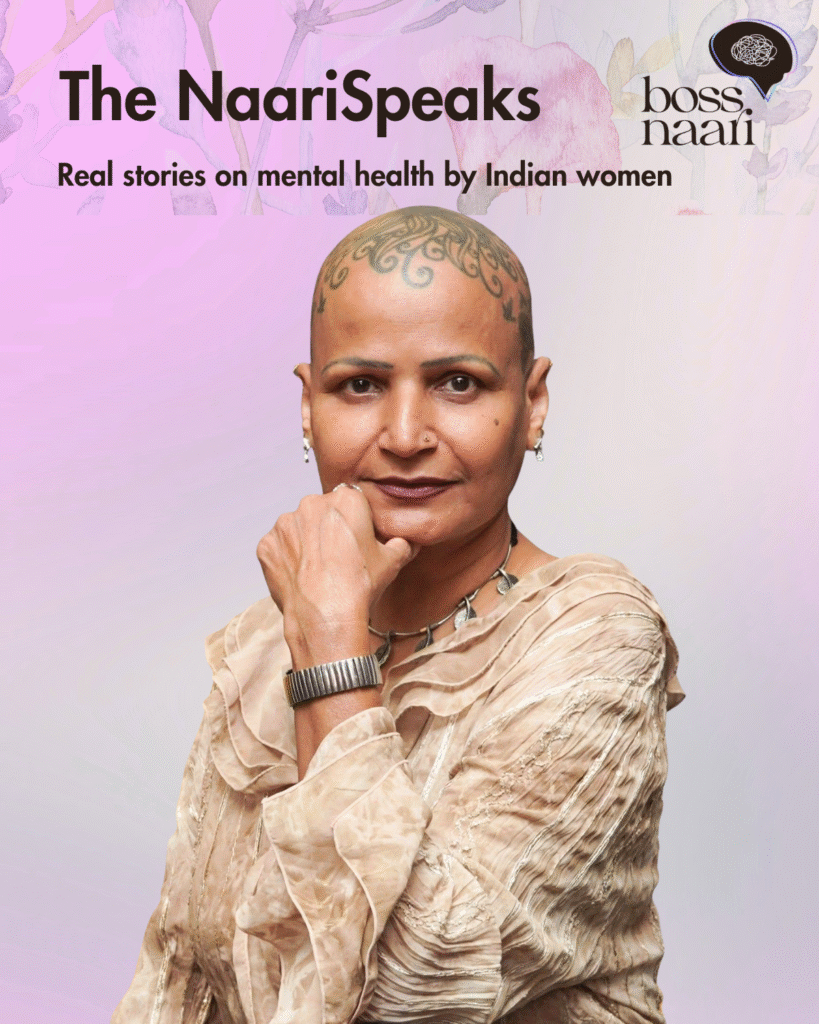
Boss Naari: How did your diagnosis impact you initially, both emotionally and mentally? How challenging was it?
Ketaki: At that time, I felt like everything was over. I kept thinking, how would I live like this? It didn’t feel like a normal illness. This was visible and noticeable hair loss, and it deeply affected me mentally. I started feeling different, like I didn’t belong in society. I kept asking myself, how would I face people?
We often see people with cancer or other illnesses who lose their hair, and we feel sympathy. But when it happens to you, it hits differently. That kind of change makes you feel broken. I even went into depression. For five years, from 2010 to 2015, I never felt good about myself. I kept trying every medicine but nothing worked. The depression stayed.
There were moments when I felt deeply ashamed for not having hair, almost as if I had committed a crime. It was painful because people talk behind your back, they stare, and their eyes are full of questions. Everything becomes noticeable. I was constantly afraid of what people would think when they saw me.
There came a point when I couldn’t even look at myself in the mirror. I would cry alone in the bathroom. Every time I washed my hair after applying the prescribed medicines, more hair would fall out. I would wake up and find hair on my pillow and all around me. When I first noticed the small bald patch, I never imagined it would turn into something this big. I didn’t know that a small spot would change my life so much.
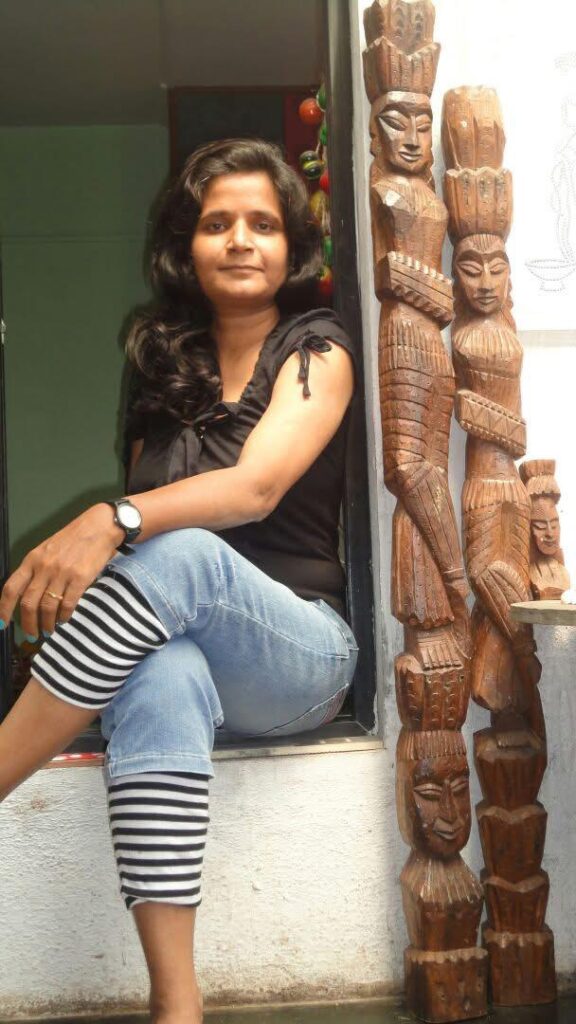
Old photo of Ketaki when she had long hair
Boss Naari: You’ve shared that you went into depression during the early stages. Could you describe what those years felt like for you, and what helped you the most during that time?
Ketaki: Those years were very dark for me. I felt like I couldn’t live anymore. In 2015, I reached such a low point that I tried to end my life. In the month of December, between 2:45 and 3:15 at midnight, I had a dupatta in my hand and stood by the table, ready to give up. But then I looked into the other room and saw my kids sleeping.
At that moment, I asked myself, what will happen when they wake up? What message will I leave behind for them? That their mother gave up on life just because of her hair? That thought hit me hard. I stepped back.
From that moment, I never looked back. And I again fell in love with life, I started my life again with a positive approach. After that night, for the first time in five years, I went to the office on time and without covering my head. Before that, I would go to the office early, before anyone else arrived, and leave late, after everyone had gone, just so no one would see me. But this time, I walked in with confidence. I looked people in the eye.
I told myself, this is my bonus life. I will not care what others think. I will live fully, freely, and for myself.
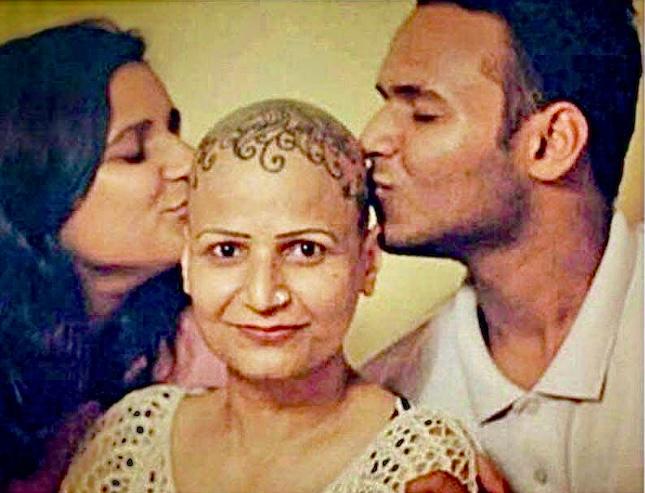
Ketaki posing with her kids
Boss Naari: During your difficult phase, what role did your family and friends play? How did their support or lack of it, affect you?
Ketaki: My in-laws were not supportive, often mocking me and calling me bad luck. They kept telling me to just wear a wig and get over it. At that time, my husband was living in Gujarat. Some relatives would cry in front of me, but I would say, “I am alive, only my hair is gone.” I have moved on from them now, but back then, their true colors were seen after I developed alopecia.
My brother and sister-in-law never cried in front of me because they did not want me to feel bad. And my kids were my biggest support. Whenever someone said something hurtful, my little one would stand up and fight for me. Once, she even said she would cut her hair so we could look alike. My dog’s love for me never changed either.
Later, I met many other new people after alopecia who became my friends. Although some people have been reduced from my life, now new windows opened and new people came into my life.
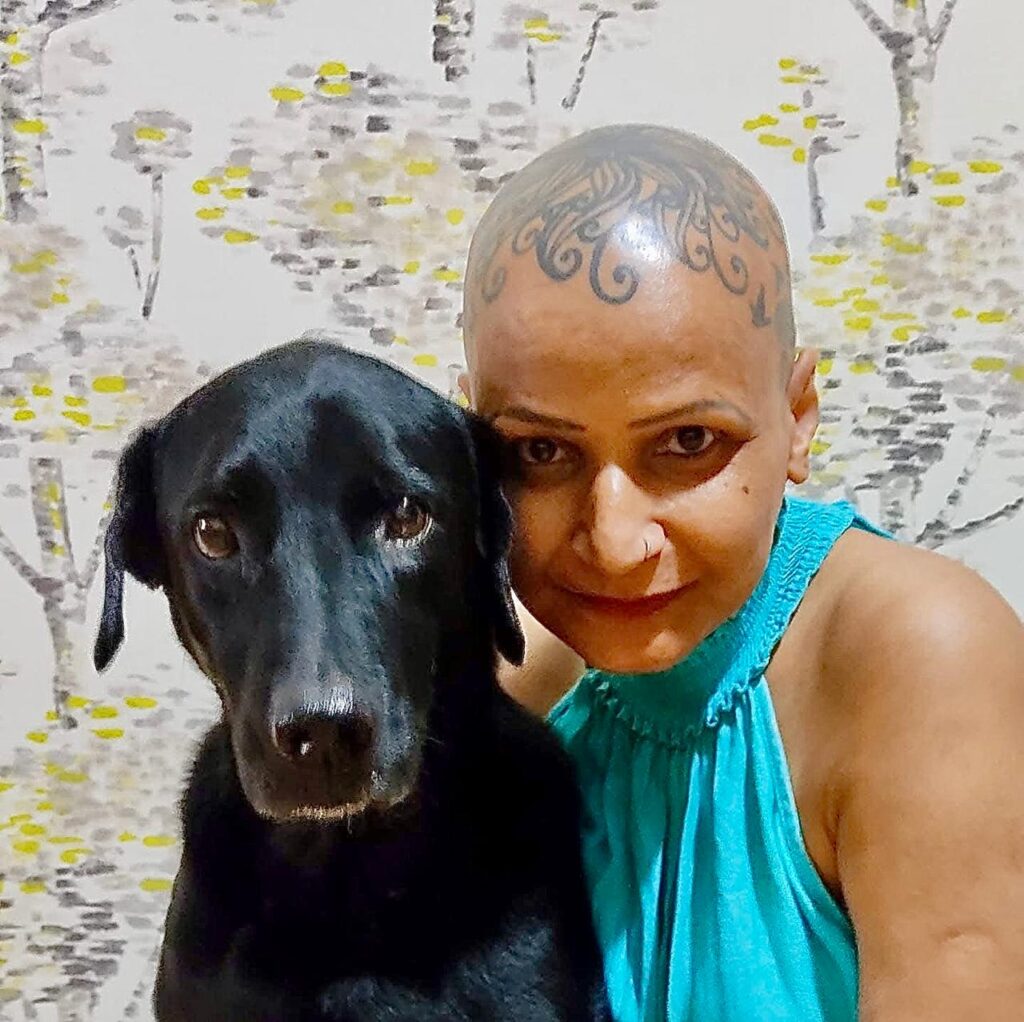
Always the same love from her dogs
Boss Naari: As you started healing and rediscovering yourself, were there any unique ways you chose to express your journey or reclaim your identity?
Ketaki: I wanted to work on myself, both physically and emotionally. At one point, after my diagnosis, I came out of that dark phase of five years, where I took medicines every day that affected my body. I realized I needed to do something positive for my body, which had been deeply affected, my weight had reached 90 kilograms. On top of that, not having hair brought a very different kind of feeling, it was like I could not drape a saree because of having no hair and wondering how I would look. So I decided to take one step at a time.
For a long time, even before my hair loss, I had wanted to get a tattoo. And then one day, I was looking into the mirror and I felt like God had already given me a beautiful canvas. Why not get a tattoo here? This tattoo helped me gain more confidence.
The first thing I did after getting the tattoo was drape a saree, and I truly felt good. With this tattoo, everything changed. This wasn’t about inspiring someone else; everything I did was to make my mind and body feel good, to feel happy again.
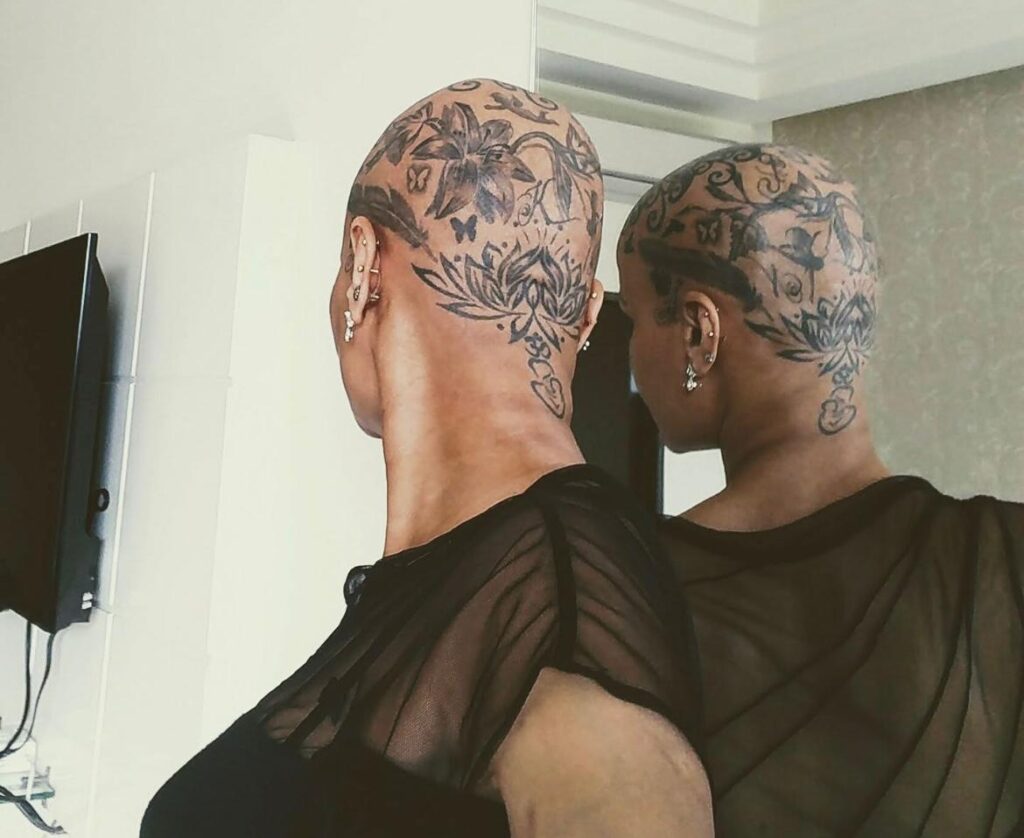
Snapshot of Ketaki’s tattoo on her bald head
Boss Naari: There’s a common belief that women are only beautiful if they have hair. What do you want to say about that?
Ketaki: That belief is completely wrong, and it’s time we stop accepting it as truth. Alopecia has been around for a long time, but even today, people still end their lives because of it. That’s because society puts so much pressure on appearance, especially on women.
This pressure needs to end. These deep-rooted societal beliefs continue to harm people with alopecia. We must challenge society when it is wrong. Beauty should not be measured by skin tone, hair, or appearance.
There is no such thing as a “beauty standard.” What truly matters is knowledge, strength, and kindness. People often say that society has evolved, but many still say things behind my back like, “If we saw her in the dark, we’d get scared.” And these comments come from people in cities, people who are educated.
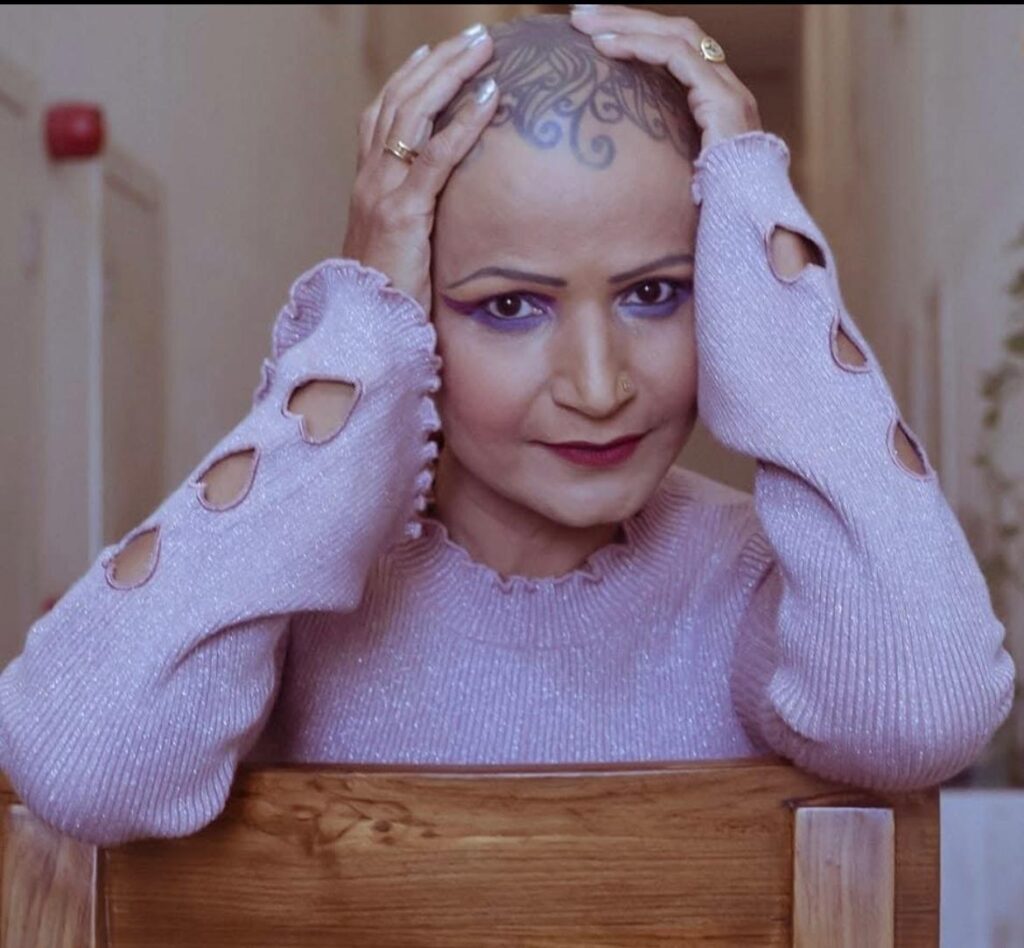
Bold and beautiful
Boss Naari: Now as you’ve said that beauty isn’t tied to hair. What bold actions did you take to make this message heard loud and clear?
Ketaki: People said I was too proud of my beauty and hair before alopecia, as if nature was teaching me a lesson. Since my body had been affected, I realized I needed to do something positive for my body. And I thought, this time, I should make right what I had done wrong to my body. People often say, “Hair is the jewelry of women.” Because of this, many feel afraid of alopecia. I wanted to change the way beauty is connected with hair. I wanted to do something no one with alopecia had done before and send a message that life goes on and people should not feel ashamed about alopecia.
That’s when I decided to participate in beauty pageants and also gave the slogan “Let’s uncover alopecia.” The reason I chose beauty pageant as a stage is because this is the place where women are celebrated for their beauty. So, I participated and became the first alopecia model and also competed in Mrs. Universal 2018 which was held in the Philippines.
Boss Naari: How did people react to you during the beauty pageants? Were they supportive?
Ketaki: The participants were nice to me on the face, but behind my back, they were not kind. They laughed and wondered why I was even there and used my condition as a weapon against me. However, the judges and the program organizers were very positive. They motivated me and gave me great support.
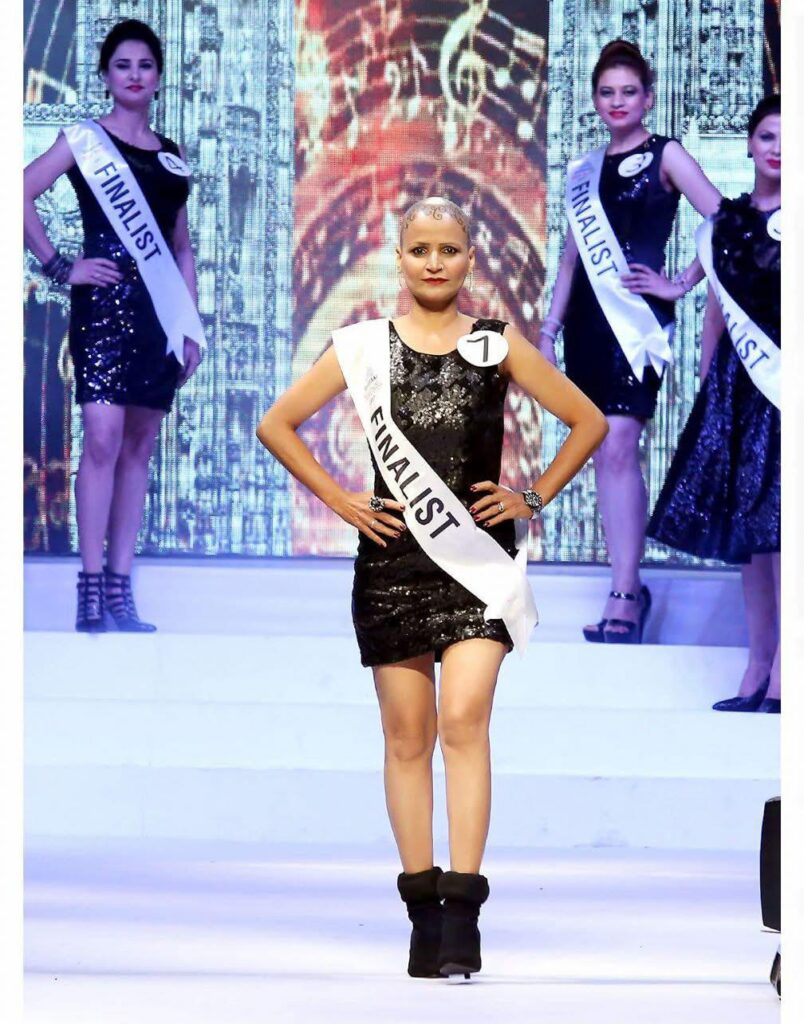
Photo of Ketaki during her ramp walk as a finalist
Boss Naari: What is one message you would like to share with others going through their own struggles?
Ketaki: If I had lived my life worrying about what people think, I wouldn’t be here today. I stopped entertaining those thoughts and started doing things that inspired me.
I want to tell anyone who’s feeling broken, whether it’s because of an illness or any change in your body, that as long as you’re alive, nothing is over. You can still do something meaningful.
I lost my hair, but I didn’t lose my spirit. In fact, I ended up doing everything I couldn’t do when I had hair. I never walked a ramp when I had hair, but I did it proudly without hair. Even something you think is your weakness can become a form of art. Don’t waste time thinking, “How will I live like this?” Life gives us hundreds of reasons to keep living.
I once read a line that stayed with me:
“Nikaal laayi hoon parinde ko pinjre se, ab pinjre ko parinde se nikaalna hai.”
I broke free, but now I have to free the cage from myself. The cage we carry of fear, fear of what people will say. Break that fear. Live freely. Love yourself.
Want to be featured on NaariSpeaks?
Do you have a story that could inspire another woman or help someone going through a similar journey? We’d love to hear from you and share your voice with our community.
Liked what you read?
Sign up and get the latest blog posts delivered straight to your inbox.
We respect your privacy
Related Arcticles

Down syndrome didn’t define her; dance did
Down syndrome didn’t define her; dance did Dance became the language of Sayalee Agavane, a Down Syndrome professional dance artist who has transformed every stage

Raising a child with Down Syndrome
Raising a child with Down Syndrome Parenting a child with Down syndrome is a journey filled with unique experiences, and the early days of acceptance

Living with extra chromosomes
Living with an extra chromosome Down syndrome cannot stop anyone from achieving their dreams, and Madhumati Indalkar is a beautiful example of that. Madhumati has
